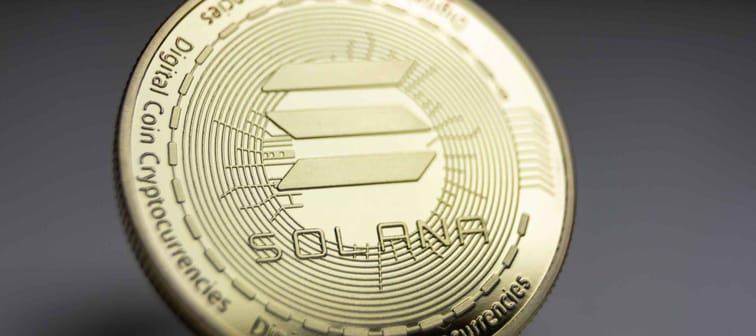The short version:
- Solana and Ethereum are both blockchain platforms designed to help users create decentralized applications.
- Solana and Ethereum have some similarities but also major differences when it comes to their purposes, consensus mechanisms, scalability, costs, and security.
- The comparison between Solana and Ethereum is expected to look very different once Ethereum 2.0 is released, which will improve the platform’s scalability.
- While both Solana and Ethereum can be excellent investments, Ethereum remains the favorite for most investors.
Meet Your Retirement Goals Effortlessly
The road to retirement may seem long, but with WiserAdvisor, you can find a trusted partner to guide you every step of the way
WiserAdvisor matches you with vetted financial advisors that offer personalized advice to help you to make the right choices, invest wisely, and secure the retirement you've always dreamed of. Start planning early, and get your retirement mapped out today.
Get StartedWhat is Solana?
Solana is a decentralized blockchain designed to enable scalable and user-friendly apps. This open-source project was created in 2017, and the Solana Foundation, which maintains it, has its headquarters in Geneva, Switzerland. Solana is also known for its native coin, SOL.
Solana was made with scalability in mind. The platform can process up to 65,000 transactions per second, and further advancements in the technology could improve those numbers even more.
Solana claims to be the fastest blockchain in the world, with a rapidly expanding ecosystem in cryptocurrency, decentralized finance, non-fungible tokens (NFTs), and more.
One of the most important features of the Solana platform is its speed. Solana has the ability to process up to 65,000 transactions per second, which outshines all of its competitors. It’s also known for its affordable transactions. Thanks to Solana’s scalability, its transactions are promised to remain below $0.01 for both developers and users.
Learn more: How to buy Solana
What is Ethereum?
Ethereum is a community-run blockchain platform created to power thousands of decentralized transactions, as well as its native cryptocurrency, ether (ETH). It is the second most popular blockchain platform and cryptocurrency — second only to Bitcoin — and is the most popular in the creation of smart contracts and decentralized app creation.
The Ethereum platform is known for its smart contracts, which allow participants to enter into transactions with no central authority.
One of the most appealing features of Ethereum is its decentralization. It’s a fairly straightforward process for anyone to become a validator and to create consolidation, decentralized applications. There’s no limit to what individuals can use the Ethereum platform to do, which encourages innovation.
More on ETH:Ethereum 101: everything you need to know about investing in ETH
Stop overpaying for home insurance
Home insurance is an essential expense – one that can often be pricey. You can lower your monthly recurring expenses by finding a more economical alternative for home insurance.
SmartFinancial can help you do just that. SmartFinancial’s online marketplace of vetted home insurance providers allows you to quickly shop around for rates from the country’s top insurance companies, and ensure you’re paying the lowest price possible for your home insurance.
Explore better ratesSolana vs. Ethereum
Solana and Ethereum are two of the most popular blockchain platforms, as well as two of the most popular cryptocurrencies by market capitalization. Ethereum has been around longer and remains an industry leader, but Solana has plenty of features that make it a real contender.
Purposes
Solana and Ethereum were created with different purposes in mind. As a result, they stand out for different reasons and have different uses for their community.
Solana was designed with speed and scalability in mind. It’s an open-source, high-performance, permission-less blockchain with the goal of processing as many transactions per second as possible and, as a result, keeping transaction costs low.
Ethereum, on the other hand, was designed for the creation of decentralized apps and organizations. The platform relies heavily on smart contracts, which are computer programs that facilitate transactions on the blockchain.
PoW vs. PoH
Ethereum and Solana rely on two different consensus mechanisms. Ethereum relies on a Proof of Work (PoW) mechanism. This means the network is secured by miners who use their computing power to verify the accuracy of new transactions in the blockchain. While this PoW mechanism results in slower processing, it also ensures greater security.
Solana, on the other hand, uses Proof of History (PoH). This consensus mechanism requires a series of computational steps to determine the passage of time between two events. According to Solana, this mechanism allows transactions to be verified more quickly and is a part of why the platform can process so many transactions per second.
Scalability and cost
One of the most important differences between Solana and Ethereum is their scalability. Solana was made with scalability in mind. The platform can process up to 65,000 transactions per second, and further advancements in the technology could improve those numbers even more. Thanks to these speeds and the scalability of Solana, transaction costs are very low and remain less than $0.01.
The scalability of Ethereum looks very different. Unfortunately, the platform can only process about 15 transactions per second, which hardly competes with Solana’s processing speeds. And as a result of the slow processing times, transaction fees are also considerably higher. Ethereum’s notorious gas fees have reached nearly $200 per transaction. And while they aren’t that high today, they are considerably higher than Solana’s.
Security and past breaches
Security has been a major concern when it comes to cryptocurrency, and it’s an important consideration when comparing Solana and Ethereum.
As we’ve mentioned, the Ethereum platform uses a Proof of Work consensus mechanism, which is known to be more secure than alternatives. Solana, on the other hand, uses a Proof of History consensus mechanism. While this mechanism allows for considerably faster processing speeds, those speeds come at a cost. Unfortunately, Proof of History doesn’t provide the same level of security.
Neither Ethereum nor Solana is completely secure from hackers. As of the end of March 2022, more than $1.3 billion in cryptocurrency had been stolen in 78 different attacks in the first three months of the year. More than $1 billion of those losses were from hacks on both the Ethereum and Solana ecosystems. Ethereum was harder hit however, primarily because of a hack on the Axie Infinity sidechain Ronin Network, in which more than 173,000 Ethereum was stolen.
Related: 51% Attacks: What are they and which cryptos are the most vulnerable?
Solana vs. Ethereum 2.0
So far, our comparison of Solana and Ethereum has been limited to Ethereum 1.0, which is the current blockchain. But the platform has been in the process of a multi-phased upgrade Ethereum 2.0, also known as Eth2 or Serenity. The merge to Ethereum 2.0 is currently scheduled to take place in Q3/Q4 2022.
This platform upgrade is intended to improve characteristics of Ethereum’s scalability and security. One of the most significant changes with Ethereum 2.0 will be a change from Proof of Work to Proof of Stake. Proof of Work, despite its security benefits, is highly inefficient. It requires lots of processing power from miners, which increases the associated carbon emissions and slows down transaction speeds.
Proof of Stake allows transactions to be verified using staked cryptocurrency. The validators who stake their cryptocurrency will play a similar role as the miners in Proof of Work but will use significantly less energy.
This energy efficiency will considerably improve Ethereum’s scalability. In fact, the platform is expected to be able to process up to 100,000 transactions per second, which is more than Solana can currently process.
It also doesn’t appear Ethereum’s increased scalability will happen at the expense of its security. In fact, the upgrade is expected to make Ethereum even more secure.
Once Ethereum 2.0 becomes a reality, the comparison between the two platforms looks very different. It appears Ethereum will outshine Solana in the one area where it currently has a major advantage, which could cause more investors and developers to stick with Ethereum instead of branching out to Solana.
Ethereum 2.0 is also set to become greener. Learn what that means here.
Solana vs. Ethereum: investing performance
The Solana and Ethereum blockchains provide plenty of exciting opportunities for developers and individual investors. Each platform has its own native coin, SOL and ETH. But how do you decide which to invest in?
Both Ethereum and Solana can be excellent investment opportunities, but they have some major differences. First, Ethereum is considerably more popular than Solana. As of July 18, 2022, Ethereum had a market capitalization of $190.23 billion. It’s the second largest cryptocurrency on the market.
On the same day, Solana reached a market capitalization of just $15.7 billion. It’s ranked as the ninth-largest cryptocurrency.
Since its creation, Ethereum has had a total return on investment (ROI) of about 55,140%. Meanwhile, Solana’s total ROI sits at about 20,553%.
Of course, none of this necessarily means that Ethereum is inherently a better investment than Solana. Ethereum has been around longer, so it makes sense it would have seen more growth. But Ethereum’s name recognition and higher trading volume still could make it more appealing to the average investor.
The bottom line: which is better?
It’s difficult to compare two cryptocurrencies or two platforms and definitively say that one is better than the other. It’s clear both Ethereum and Solana have major selling points.
Ethereum boasts long-term stability and security, along with its robust smart contract capabilities. It also has a higher trading price and more proven success as an investment. Solana, on the other hand, has the edge when it comes to speed and scalability.
But as we’re comparing the two, it’s important not to look only at what the platforms are today. We know that Ethereum is in the process of a major upgrade that will help it surpass Solana in terms of speed and scalability. And considering that’s the one downside Ethereum currently has, the platform will look even more appealing when the merge to Ethereum 2.0 is complete.
As a result, while there’s not necessarily one that’s better than the other, Ethereum does appear to have an edge. And it’s easy to see why it’s favored by investors and developers alike.
Sponsored
Follow These Steps if you Want to Retire Early
Secure your financial future with a tailored plan to maximize investments, navigate taxes, and retire comfortably.
Zoe Financial is an online platform that can match you with a network of vetted fiduciary advisors who are evaluated based on their credentials, education, experience, and pricing. The best part? - there is no fee to find an advisor.










